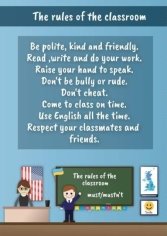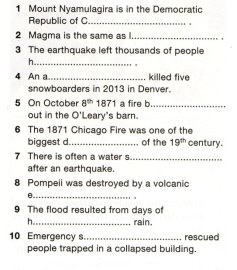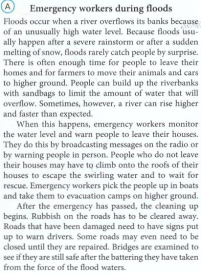Урок "Natural Disasters" 7 клас
Клас: 7-Б
Тема: Natural Disasters
Мета: to practice and enlarge previously taught vocabulary on the topic; to practice speaking skills in dialogues and monologues; to encourage pupils to talk about and give opinions of the topic; to develop Ss’ creative skills, their abilities to express their thoughts logically; to promote interest in the world of natural disasters
Методично-дидактичне забезпечення: WB, SB, cards
Хід уроку
- Organizing moment
Teacher: Good morning, class! I’m glad to see you. How are you? I hope you are fine and ready to work hard, aren’t you? So, let’s start our lesson. Let’s remember the rules of the classroom

II. Targeting
Teacher: Look at the blackboard. What do you see?
Pupils: volcanic eruption, hurricane, flood, tsunami, tornado, earthquake, fire fighters, rescue team, lightning
Teacher: What will we speak today about?
Pupils:
Probably we’ll speak about the extreme weather.
Perhaps we’ll discuss natural disasters.
It seems to me we’ll talk about problems connected with natural disasters.
It may be a discussion about the weather phenomena in the world.
As for me I also think that the matter is natural disasters.
Teacher: Thank you very much. All of you are quite right. Our today’s topic is: “Natural disasters”. Today we are going to speak about different kinds of natural disasters. Clear up how these natural disasters affect humans and what we should do to live with them and to protect ourselves from different natural catastrophes. We live in a magic world. This wonderful world is our nature. Nature gives us life. Nature teaches us to be kind and clever, attentive and creative. It teaches to understand the world around us. But our Planet is very fragile. Every year small and big natural disasters occur in different parts of the world.
So our purposes for today’s lesson are:
- to recognize, understand and practice words and words combinations related to the topic;
- to participate in common conversational exchanges about the topic of today`s lesson;
- to discuss some statements.
III. Warming-up
T.: Before we start our lesson let’s talk about natural disasters. I’ll give you some cards; you should make up a question, read it and present your answer to the class.
- why did dinosaurs become extinct?
- what are some of the problems people often have after a natural disaster?
- could Internet be helpful in case of a disaster?
- what are often the results of natural disasters?
- what’s the worst natural disaster?
- have you ever seen a natural disaster movie?
Examples:
I think ...
To my mind...
I believe...
I’m not sure that...
IV. Main part
1. Vocabulary practice
- label the pictures with the words from the list: drought, flood, car accident, ship wreck, train derailment, earthquake, wildfire, plane crash
- Put the above disasters in the correct category
|
Natural |
Man-made |
|
|
|
- Look at the pictures and fill in the gaps in the headlines with words from the list: hurricane, famine, tsunami, avalanche
- Match the disasters with what people say
- Match the nouns in the columns to the verbs in the list
- Read and complete the sentences
-

- match these cards in the right order. “What do we need in a case of a natural disaster?”
- A fire extinguisher – to put the fire out
- A life belt – to safely to the beach
- A mobile phone – to call for help
- A torch – to find your way
- A life jacket – to prevent yourself from drowning
- A whistle – to attract attention
- An axe – to cut the rope
- A first aid kit – to treat a wound
2. Listening
T: Do you know the places where the natural disasters happen most of all? Now you are going to watch the video about Top 10 Infamous Natural Disasters of the Last 100 Years and fill in the gaps.
|
Year |
Disaster |
|
|
|
What natural disasters are mentioned in the video?
3. Reading for specific information
1. T: answer my questions, please
Who are emergency workers?
Name the professions involved in rescue work.

2. Mark the sentences True, False or Non-stated
1.Floods are usually an unexpected event for people.
2.People can withstand small floods.
3.Emergency workers help people to climb on the roofs to escape flood.
4.Severe floods often happen in spring and autumn.
5.After flood the streets and roads are clean and freshly washed.
6.Emergency workers have a lot to do after the water has gone away.
3. Complete the sentences
Floods usually happen after a severe …. or after a sudden melting of snow.
There is often enough time for…..to leave their homes.
People can…. the riverbanks with sandbags to limit the amount of water.
A river can rise higher and….than expected.
Emergency…..monitor the water level and warn people to leave their houses.
People who don’t leave their houses may have ….onto the roofs.
Emergency workers pick the people up in…..
Rubbish on the roads has to be…..
Roads that have been…managed need to have signs put up.
Some roads may even need to be closed until they are……
4. Answer the questions
- What characteristics are necessary to be an emergency worker?
- Would you like to be an emergency worker? Why?
4. Checking up of Ss’ home task
Teacher: your home task for today was to prepare short information about the famous natural disasters in the world.
During the presentations other pupils are making notes
|
Country |
When |
Natural disaster |
|
|
|
|
5. Project work
T: We revised different types of natural disasters, what equipment we need in a case of a natural disaster and now you`ll work in groups –you should make up a Survival Guide about one type of natural disaster.
You should mention:
- Title.
- Basic information about the natural disaster.
- Survival techniques
III. Summing up. Assessment.
Teacher: Well, students. Let’s do the conclusion. Do you remember the purposes of our lesson?
I hope you`ll find the way to help Nature and to protect yourselves from natural disasters. Oskar Wild said: “Who are you to bring the pain into God`s world?” Let`s bring happiness and peace. I’m pleased with your answers and work. Thank you for your participation. Thank you for today’s lesson.
Your marks are:
See you in a week.
IV. Home task


про публікацію авторської розробки
Додати розробку
